ABOUT US
MAPS
The MAPS (Monitoring Avian Productivity and Survivorship) program, which is conducted through the IBP (Institute for Bird Populations), is a continent-wide effort to conserve avian populations and their habitats through bird banding.
MoSI
MoSI is a collaborative, international network of bird monitoring stations across the northern Neotropics that bolsters conservation efforts through population monitoring. Since 2002, the program has operated more than 250 stations in 22 countries.

Banding Locations
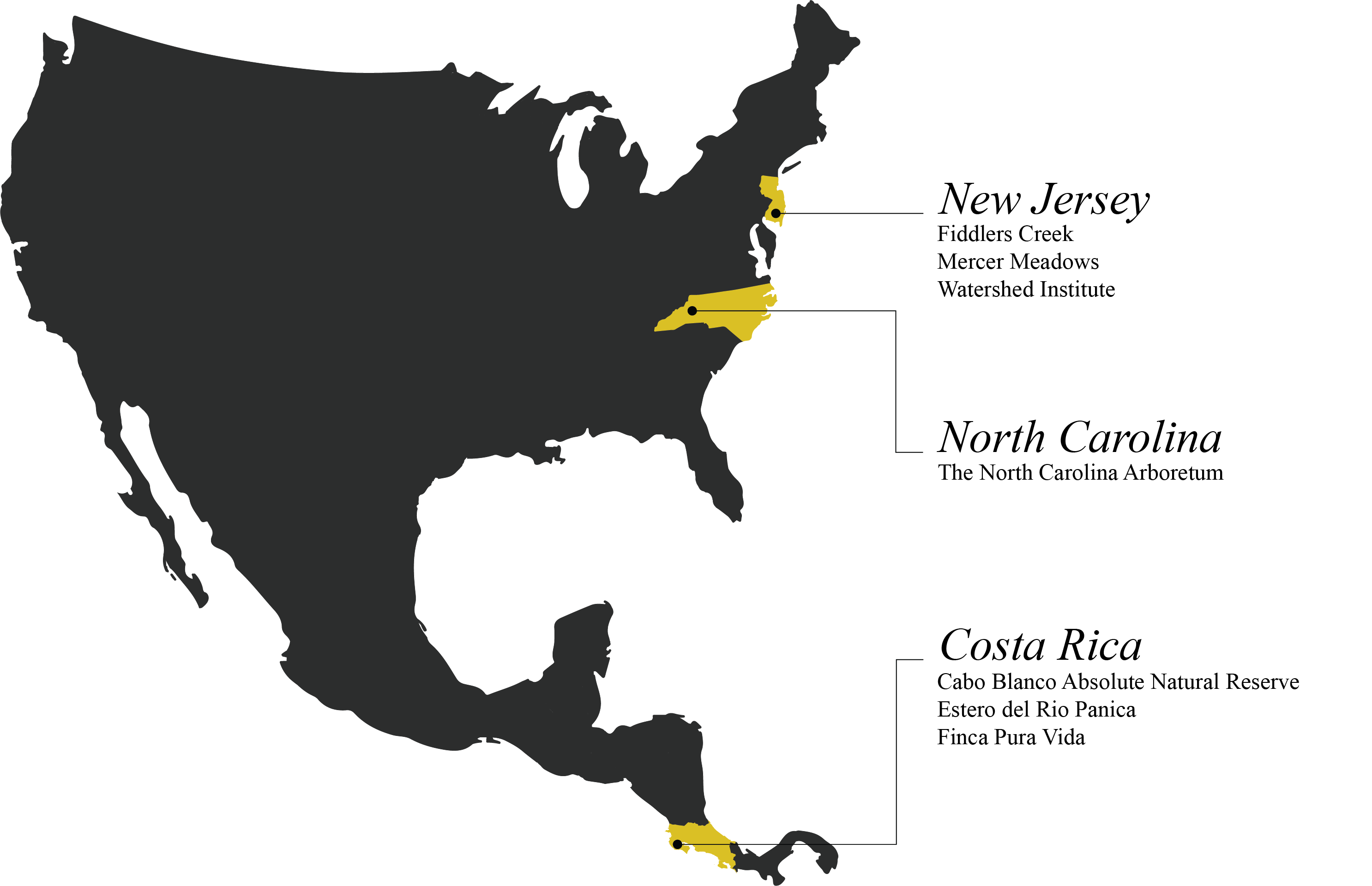
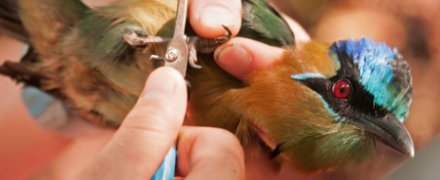
Nicoya Peninsula
WBRG’s Nicoya Peninsula Avian Research Station is a research and monitoring program in northwestern Costa Rica. NPARS studies site fidelity, survivorship, population demographics and habitat partitioning of nearctic-neotropical migrants, and age- and sex-deterministic characteristics in neotropical residential birds.
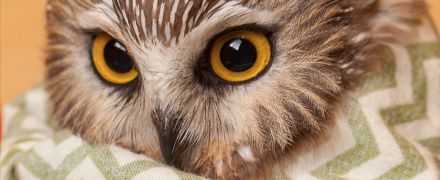
Saw-whet Migration
WBRG studies the migration and winter ecology of eastern North America’s smallest owl, the Northern Saw-whet Owl. WBRG staff capture and band Saw-whet Owls at multiple sites during the fall migration, and participate in a continent-wide network of owl researchers studying large-scale Saw-whet biology. During the winter, WBRG fits Saw-whets with temporary radio transmitters to track their movements and identify critical roosting habitat characteristics.
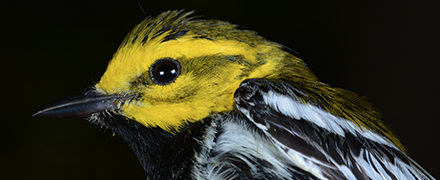
The NC Arboretum
The North Carolina Arboretum is located in Asheville, North Carolina within the Southern Blue Ridge Mountains. The Arboretum serves as a land steward and environmental educator for 434 acres of Pisgah National Forest, which spans over 500,000 acres across western North Carolina.
This research station is tailored to bridge the geographic research gap of Wild Bird Research Group, while aligning with both the mission of the MAPS banding program and The North Carolina Arboretum.

Nicoya Peninsula
WBRG’s Nicoya Peninsula Avian Research Station is a research and monitoring program in northwestern Costa Rica. NPARS studies site fidelity, survivorship, population demographics and habitat partitioning of nearctic-neotropical migrants, and age- and sex-deterministic characteristics in neotropical residential birds.

Saw-whet Migration
WBRG studies the migration and winter ecology of eastern North America’s smallest owl, the Northern Saw-whet Owl. WBRG staff capture and band Saw-whet Owls at multiple sites during the fall migration, and participate in a continent-wide network of owl researchers studying large-scale Saw-whet biology. During the winter, WBRG fits Saw-whets with temporary radio transmitters to track their movements and identify critical roosting habitat characteristics.

The NC Arboretum
The North Carolina Arboretum is located in Asheville, North Carolina within the Southern Blue Ridge Mountains. The Arboretum serves as a land steward and environmental educator for 434 acres of Pisgah National Forest, which spans over 500,000 acres across western North Carolina.
This research station is tailored to bridge the geographic research gap of Wild Bird Research Group, while aligning with both the mission of the MAPS banding program and The North Carolina Arboretum.
Our Team
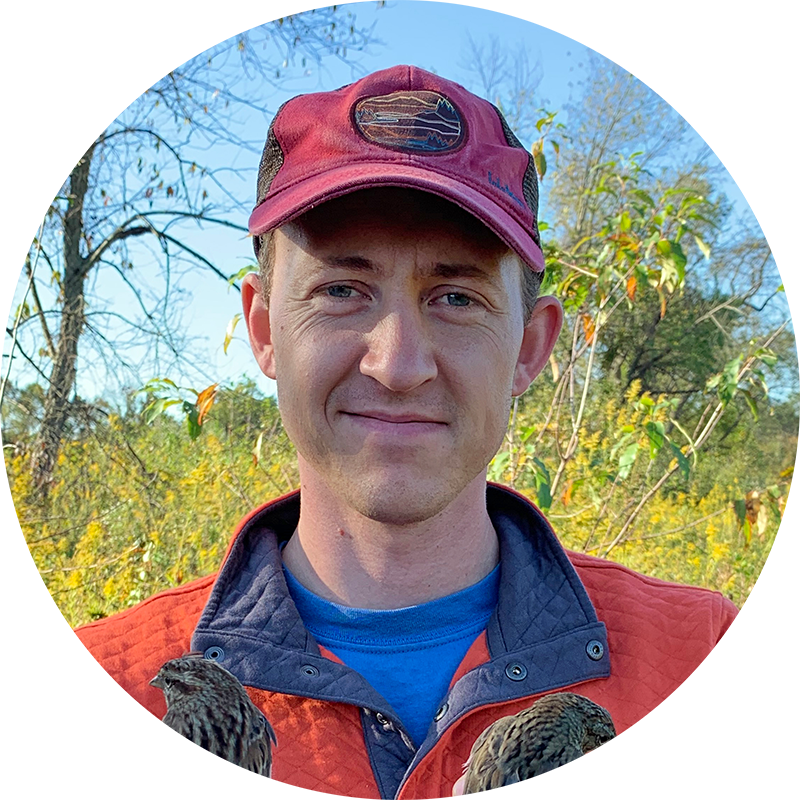
Tyler Christensen
Research Coordinator
Tyler Christensen is a founding member of the Wild Bird Research Group. He has held multiple leadership positions within the organization, including Executive Director, Research Coordinator, Treasurer, and Chair of the Research Committee. With nearly 20 years of experience as a field researcher and ecologist. Tyler specializes in studying bird behaviors such as habitat selection, migration, and foraging ecology, with a particular emphasis on nocturnal owls. Beyond his research, Tyler is a passionate environmental educator, leading programs on birding, owl ecology, and bird banding for audiences of all ages and expertise levels. Tyler resides in Highland Park, New Jersey.
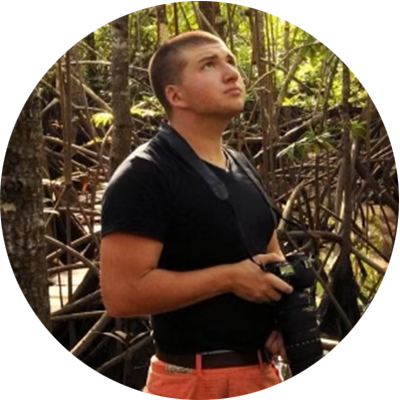
Sean Graesser
Director
Sean is a founding member and the Director of Wild Bird Research Group. Sean is a biologist, conservation photographer, and storyteller from New Jersey. In his scientific research, he specializes in birds, particularly hummingbirds, studying their habitats and migration patterns. Sean has had the opportunity to work on projects with the National Audubon Society, The Nature Conservancy, Rainforest Alliance, National Geographic, and the Smithsonian Tropical Research program. He has spent the past fifteen years in Costa Rica and Panama collecting research data and teaching tropical rainforest field techniques courses.
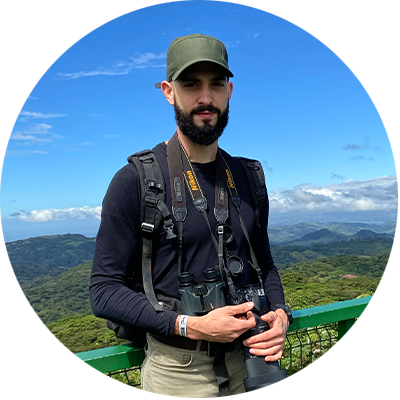
Anthony Squitieri
Regional Coordinator
Anthony Squitieri is an avian ecologist and environmental educator based in the southern Blue Ridge Mountains of Asheville, North Carolina. With twenty years of field research and bird banding experience, the past fourteen of them have been spent working with WBRG in the eastern U.S. and southern Central America. His roles with WBRG include being a “co-founding” member, serving as a former Board President, and currently serving as the Regional Coordinator of the Southern Appalachians.
For Anthony, there is no better classroom or venue for research than the southern Blue Ridge Mountains. Their combination of southern latitude and high elevation topography produce a wide variety of habitats—some unique to the Appalachian region, and some historical remnants of distant northern boreal habitats. In recent years, Anthony has developed a strong interest in studying these local high elevation boreal habitats that provide breeding grounds for relict populations of bird species that are disjunct and isolated from the rest of their regional breeding range. His current focus and long term goal is to utilize the Motus network and GPS tracking to conduct research that builds a better understanding of the behavior and ecological needs of these species in order to implement informed conservation and management practices.
In addition to research, Anthony thoroughly enjoys integrating outlets for education and outreach by providing career building opportunities for young adults to gain experience in their field through seasonal internship and technician positions. Outreach initiatives like this have also allowed him to build meaningful partnerships with many regional institutions; such as his alma mater, the University of North Carolina at Asheville (UNCA), where he assists with field labs and sources technicians; The North Carolina Arboretum (TNCA), where he manages and a MAPS banding station and conducts educational programing; and the North Carolina Wildlife and Resources Commission (NCWRC), where he collaborates with building Motus infrastructure and state priority research initiatives in western NC.
Avian research and education are Anthony’s passions. He takes great pride in being a part of the WBRG team and is excited for what the future of the organization will bring.
Email: asquitieri@wildbirdresearch.org
Board Members
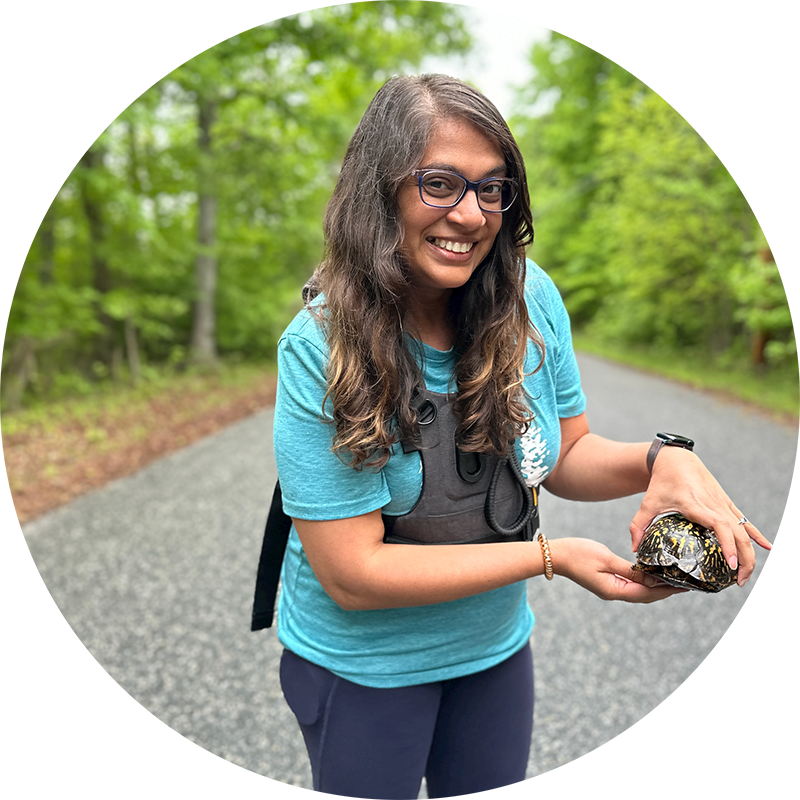
Preeti Desai
Preeti Desai joined the Wild Bird Research Group in 2020 as a Board Member at Large. In her time on the Board, she has either led and/or served on the Media and Outreach as well as the Membership and Fundraising Committees.
Preeti is a creative and dynamic communicator and storyteller with close to two decades of experience working with brands and organizations in both the nonprofit and for-profit spaces. She is currently the Director of Social Media at the Central Park Conservancy in New York City. Previously, she was the Senior Director of Social Media & Storytelling at the National Audubon Society. Preeti has extensive experience in social media and digital communications, consumer research, change management, and training consulting.
With a lifelong passion for nature and wildlife, Preeti has been fortunate to travel to many wildlife hotspots nationally and internationally to inspire and motivate people to appreciate and protect birds. She is also a hobbyist photographer whose work has been published by Audubon, Hemispheres, Time, and New York Times, among others.
Preeti currently resides in Jersey City, NJ, where she’s involved with the Feminist Bird Club of Jersey City and Jersey City Birds, and is vocal about getting people into the outdoors, especially in their local spaces.
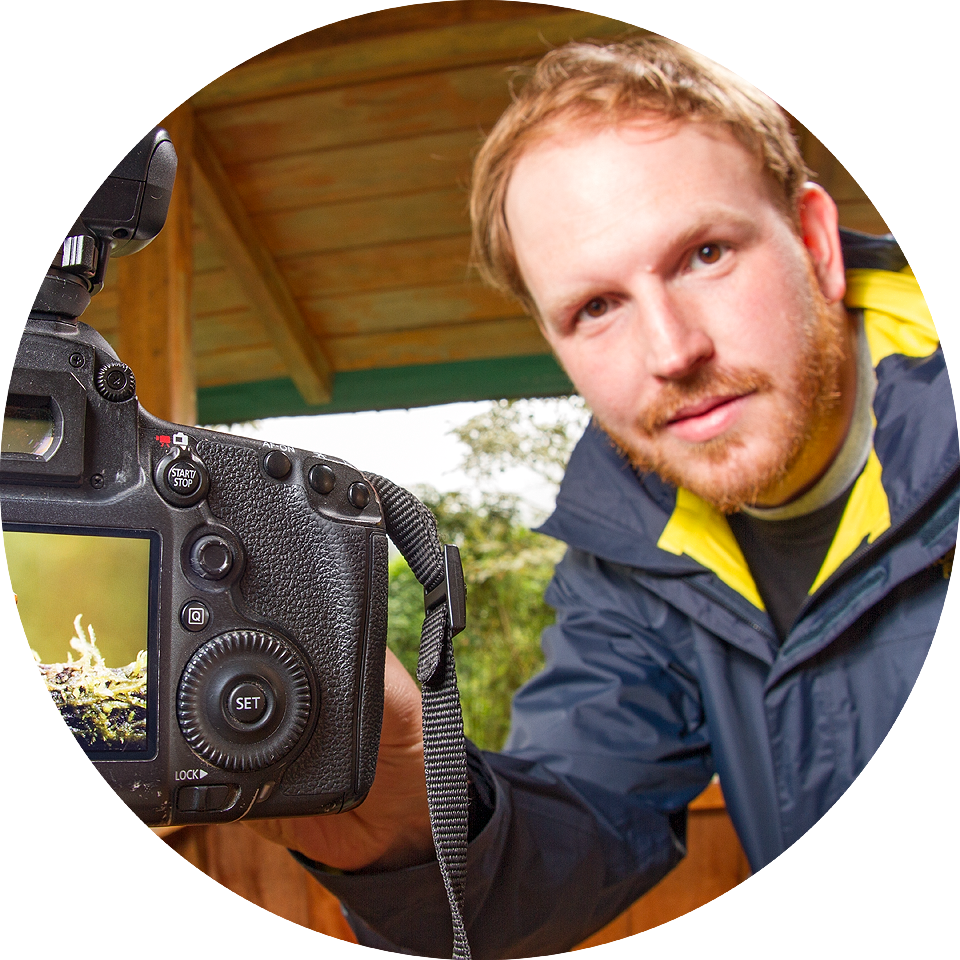
James Muchmore
James Muchmore is a conservationist with a background in communication design. With a Master’s in communication and packaging design from Pratt Institute and over 15 years of experience in the corporate design world, he has taken his learnings and now applies them to conservation.
For the last eight years, he has worked on his personal project, Save the Chocó, which brings attention to one of the most biodiverse regions of the Americas and the world. Partnering with Fundación Jocotoco, one of the largest private landowners and conservation NGOs in South America, James has helped protect over 40k acres in the Ecuadorian Chocó. Following the success of the project, James joined Fundación Jocotoco in 2017 as their US communications director.
Since then, he has helped spearhead many campaigns, including creating the first protected area for the newly discovered Blue-throated Hillstar, a hummingbird that lives in a remote region of the Andes threatened by monoculture. James is also head of conservation for Friends of Greenwich Point, where he works on projects that benefit the ecological makeup of the park, such as organizing vine cuttings and native plantings. Additionally, he is a board member of Hondu Herp and a member of the Linnaean Society of New York. These roles support his passions for bird watching, herping, orchid nerd-ing, and photography.

Shayna Marchese
Shayna Marchese joined the Wild Bird Research Group as a Board Member at Large in 2022. She is a New Jersey-based birder and hobbyist bird and nature photographer.
Shayna has over two decades of experience as a graphic designer, from print publication to packaging to museum exhibition design. She has also worked as a librarian, archivist, and collections photographer.
She is a Christmas Bird Count co-compiler responsible for organizing ten to twelve team leaders each year and making sure the territory in Hudson and Bergen Counties is covered continually, while adding additional locations and participants whenever possible. She’s found joy in creating an easily-accessible record of the count’s data, as well as making sure efforts are included (and not duplicated) in eBird. She’s an advocate for birds and nature and has been especially involved in the ongoing efforts to protect the Caven Point section of Liberty State Park.

Natalie Micale
Natalie Micale joined the Wild Bird Research Group in 2024 and serves on the Strategic Planning Committee. She is a seasoned executive coach, keynote speaker, and communication consultant. Prior to founding her business, Natalie spent nearly two decades in healthcare as a Registered Dietitian Nutritionist before moving into administration and leadership.
Natalie earned her undergraduate degree from Michigan State University and completed her graduate internship at Johns Hopkins Hospital in Baltimore, Maryland. In 2018, she returned to Michigan State University to obtain her master’s degree in management, strategy, and leadership from the Eli Broad College of Business. She is also trained through the College of Executive Coaching and is a Certified Professional Career Coach. Additionally, Natalie is the co-founder and host of Empowerment Collective, an in-person networking and speaking platform for women in Asheville, North Carolina.
Originally from Metro Detroit, Natalie now resides in Asheville with her husband, Matt, their two rescue dogs, Violet and Oliver, and their formerly stray cat, Winnie.

Mark Bean
Mark Bean joined the Wild Bird Research Group in 2020 and currently serves as the board President and as a member of the Executive Committee and Fundraising & Membership Committee.
Mark volunteers his time on the Hopewell Township Environmental Commission. He is also a Vice President on the board of Friends of Hopewell Valley Open Space where he serves on the Executive Committee and the Stewardship Committee. Mark had previously served on a board promoting STEM education and was the Vice Chair of the NYU/Stern Alumni Council. His interests in our local environment and land stewardship are a direct result of the numerous environmentally and ecologically focused organizations which serve Hopewell Valley.
Mark earned an MBA through the Executive Program at New York University’s Stern School of Business. Prior to that he earned his BS in Business Administration and Computer Science from Rider University. Mark is a Vice President of Compliance and Operational Risk for Bank of America. He has over 25 years of experience in Financial Services and holds both the CFP® and CRPC® designations.
Mark, his wife Samantha and their daughter Emma live in Hopewell Township. They have transformed their property, Flutter By Meadows, from mostly lawn with a spattering of traditional landscaping into acres of native habitats for birds, butterflies and beneficial insects. When they are not outside enjoying the haven of birds and plants, they can likely be found hiking local trails or driving their daughter to swim practice. They are vocal advocates on the benefits and the rewards of proper land stewardship which Samantha writes about on her blog and on Instagram.

